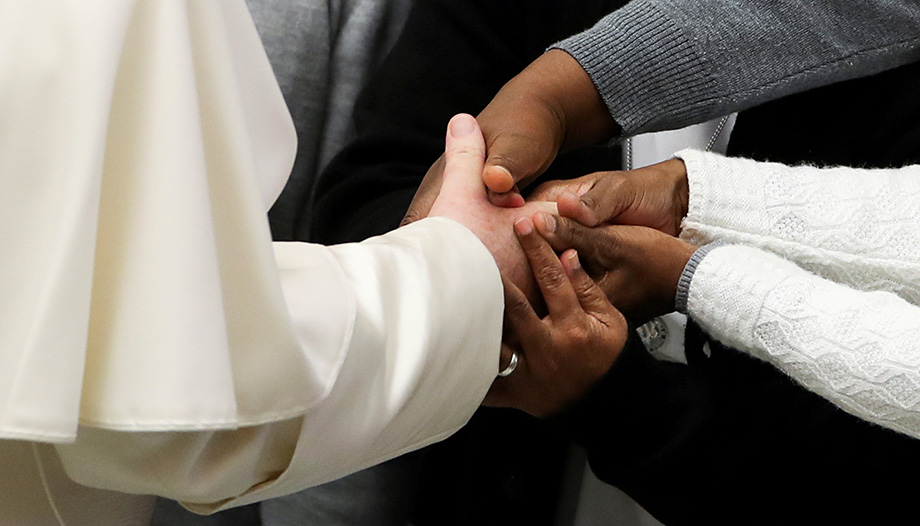To live unity in the Church and with the Pope is a gift that God gives to humble, truly free hearts. Unity is a gift and a task that every Catholic must carry out daily.
United to Christ in his Church
Unity is the property of a being that prevents it from being divided. The strongest and deepest bond of unity is love, because it is of a clearly divine character. For this reason, to speak of unity is to speak of love and to speak of love of unity is to talk about the unity of loveGod is love, that is, the unity of the one God, who is love: "God is love, and he who abides in love abides in God and God abides in him" (1 John 4:16).
Catholics know by faith the mystery of God's unity in the Trinity of persons, that is, in a communion of love. Since God is one, the Father who loves is one, the beloved Son is one, and the Holy Spirit, the bond of love, is one. We also know by faith that Jesus Christ is true God and true Man in the unit of his divine Person and that his Mystical Body, the Church, is one: one is the faith, one is the sacramental life, and one is the apostolic succession.
It is Christ who, through the life-giving action of the Holy Spirit, gives unity to his Mystical Body, the Church. For this reason, the Church, as St. John Paul II reminded us, "lives by the Eucharist" (Ecclesia de Eucharistia 1), which unites us sacramentally to Christ and makes us sharers in his Body and Blood until we form one body. Every baptized person participates in this sacred mystery of unity.
United with the Pope in the Church of Christ
Love for the unity of the Church is manifested in a very particular way in union with the Roman Pontiff, "the perpetual and visible principle and foundation of unity, both of the bishops and of the multitude of the faithful" (Lumen Gentium 23).
For this reason, Catholics must live in profound union with the Pope, in full communion with him, regardless of race, language, color, place of birth, intelligence, ability, character, taste or personal sympathy. This is a purely spiritual union, and therefore a stable, permanent one, which cannot depend on the vicissitudes of life, on the emotional attraction produced by the disposition or talent of a particular Pope, nor on the intellectual satisfaction generated by his teachings. True love for the Pope, for the sweet Christ on earth, as St. Catherine of Siena called him, is more divine than human. Hence it should be asked of God as a gift to be received, which the Holy Spirit gives to each one so that it may bear fruit in works of service to the Church.
This union with the Pope must be manifested in a profound respect and filial affection for his person, constant prayer for his intentions, uninterrupted listening to his doctrine, prompt obedience to his dispositions and disinterested service in everything he requests.
Not being more papist than the Pope
When a Pope's way of being and governing appeals to us and we feel that "there is chemistry," we can thank God because those positive emotions that arise in us will facilitate a greater prayer of petition for the Roman Pontiff. The emotionally positive is a powerful engine that paves the way to virtue.
When the way of being and governing of a particular Pope does not fully satisfy us or when we do not share some of his decisions in matters of opinion, it will be the moment to go emotionally and intellectually against the current, to purify our intention, and to increase and redouble our prayer for his person and intentions until we reach the goal of a better life. state of love and constant prayer for the Pope which has nothing to do with passing emotions or changing arguments. To love the Pope does not mean to be more papist than the Pope, but to live united to his person and intentions in Christ.
This union with the Pope, as head of the episcopal college, is also manifested in the union with each and every one of the bishops in communion with the Pope, as successors of the apostles. As St. Ignatius of Antioch (Letter to Smyrnians 8.1): "let no one do apart from the bishop anything that concerns the Church". The Church, as Pope Francis has reminded us, is essentially communion and therefore "synodal", because we all walk together (Discourse 18.9.21, among many others).
Conclusion: unity as gift and task
Living unity in the Church and with the Pope is a gift that God gives to humble hearts, truly free, that live completely in the Church and with the Pope. eucharistic (St. Justin, Apology 1, 65), within the Heart of her Son and nourished by him. In addition to being a divine gift, unity also constitutes a most pleasurable task, which requires a continuous effort and demands, each day, a new conquest, in which, once again, heaven and earth are united.








